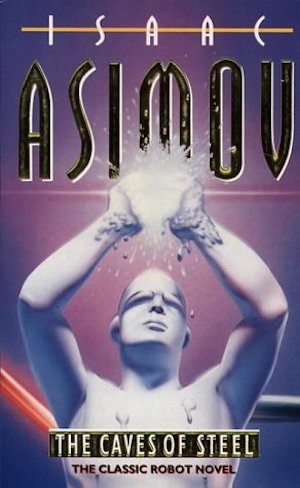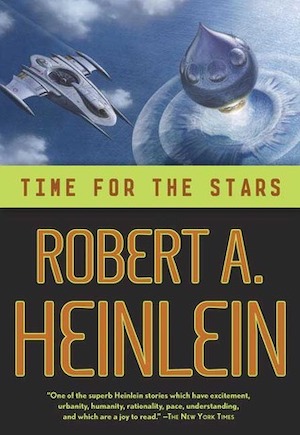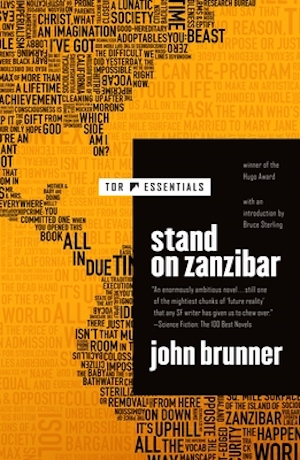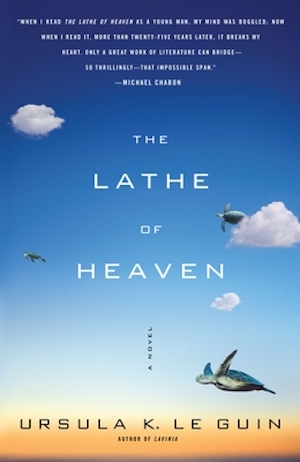The human population is currently eight billion people. While this is the highest that it has ever been, it’s no surprise. Simple math—the potential for each fertile woman to have one hundred and twenty children or more and each fertile man to father millions of children per day—suggests the potential for rapid population growth, once child mortality fell.
Overpopulation was first predicted centuries ago; steadily increasing population has been documented almost as long. Writers of science fiction have embracing this trend for plot purposes almost since the rise of the genre. There are far too many works to survey in full. Here are five that are worth reading, if you haven’t read them already.
The Caves of Steel by Isaac Asimov (1954)

Earth’s swarming eight billion people are confined to densely populated cities, leaving the countryside free for agriculture. Virtually every aspect of daily life is shaped by this stupendous population. Sustaining it is challenge enough. Too bad for Earth that other crises loom.
The situation is exacerbated by the balance of power with Earth’s ungrateful children: their three and a half billion, scattered across fifty “Spacer” worlds, greatly outmatch Earth economically and militarily. Open conflict wouldn’t favour Earth.
Spacer scientist Roj Nemennuh Sarton has been murdered; this could spark war.
New York cop Elijah Bailey discovers that not only is he assigned the crucial case, he will be working with a Spacer robot, R. Daneel Olivaw. Earthmen are known for many things but a love of robots is not among them. However, prejudice cannot be permitted to interfere with an quick solution to the looming crisis.
It could be argued that the eight billion humans are crammed into cities only partly due to land management issues. It’s also because Asimov genuinely liked densely populated cities. What some readers might have assumed was intended as dystopic seems to have been paradise to the good doctor.
Time for the Stars by Robert A. Heinlein (1956)

Five billion humans, teeming on a world where two and a half billion had struggled to feed themselves, survive thanks to harsh coping mechanisms. These include firmly enforced limits on the number of children parents may have. Twins Pat and Tom put their family over the limit. Their father’s stubborn one-man tax protest consigns the family to poverty.
Escape presents itself in the form of a curious ability neither teen knew they had: telepathy! Telepathy alone can span interstellar distances instantly. Thus, telepathic pairs like the twins provide the only means for Earth to remain in contact with its sublight exploration teams. However, only one twin can escape overcrowded Earth. The other will remain behind. How, then, to pick the lucky twin?
Which twin is lucky and which unlucky is an interesting question. On the one hand, Earth is crowded and getting more crowded. On the other, the death rate among the explorers is appalling. The twin who leaves Earth is very lucky that the narrative is first person.
You may be wondering how it is that a civilization that commands energy sources that can power relativistic starships hasn’t somehow harnessed that energy to the production of food. I certainly did…
Make Room! Make Room! by Harry Harrison (1966)

Of the seven billion frantically breeding humans on Earth, three hundred and fifty million of them call the United States of America home. By 1999, one in ten of them live in New York City. New York City is overcrowded, its infrastructure barely functional, crime is rampant, and life for the little guy is, in a word, hell.
Billy Chung deals with life in hell by commandeering the resources of the rich. In other words, he is a petty criminal. Andrew Rusch is a NYPD cop, whose job is catching people like Billy. One of Billy’s robberies goes horribly wrong, leaving well-connected hood “Big Mike” O’Brien dead. It’s a case that demands swift solution: bad news for Rusch and Chung.
Generally speaking, it’s never a good sign when SF novels about the population bomb mention Chinese people. This novel is no exception to that rule. However, with the possible exception of the Danes, noted to have very sensibly embraced zero population growth and sealed themselves off from the world, Harrison doesn’t seem to like most of the characters in this book, or the species to which they belong. The good New Yorkers are ineffectual and the rest are ignorant, greedy, and destructive.
This is the book that introduced the world to Soylent Green… well, almost. In the book, it’s just Soylent, period, and it is meat-substitute made from soy and lentils and nothing else. Filmmakers decided to sex it up a bit.
Stand on Zanzibar by John Brunner (1968)

If the whole of Earth’s seven billion were to stand shoulder to shoulder in this, the year 2010, they would cover the island of Zanzibar. The soaring population drives crowding, social breakdown, endless bickering between rival nation states, and justifies draconian eugenic laws. Thus far, human civilization has managed to keep functioning. How long can it keep up the juggling act?
The proudly nationalistic island nation of Yatakang proclaims a genetic engineering breakthrough. If Yatakang’s claims are true, they have in their hands a game changer. America must have the secret or, if it cannot, it must somehow deny the breakthrough to other nations. A deadly game of espionage ensues, but it may be only a sideshow to more important events in Africa.
As dystopic overpopulated worlds go, Brunner’s is actually rather nice. The Cold War seems long over, and the various horrors are not as all-encompassing as one might expect—doled out retail, not wholesale. It’s all very stressful, but (like a frog in monotonically warming water) experience suggests civilization can continue coping indefinitely.
The Lathe of Heaven by Ursula K. Le Guin (1971)

Dr. William Haber dreams of a better world, one in which humanity’s seven billion were not forever imperiled by the consequences of their numbers: dramatic environmental decay, food shortages, and the inevitability that Cold War tensions will soon spiral out of control and into atomic Armageddon.
Haber finds common ground with George Orr, who also dreams of better worlds. The difference between the two men is that when Orr dreams, the world reshapes itself to fit his vision.
Orr saved the world from nuclear war in 1998, dreaming into existence a reality where he was not dying in the aftermath of World War Three. Haber is certain that under Haber’s hypnotic control, Orr could rid the world of all of its imperfections. Haber is about to receive a personal lesson in the meaning of hubris.
Orr is essentially a genie in this story, the sort who delivers exactly what was wished for without concern for secondary implications. Probably there’s a story out there where the guy giving the genie its marching orders learns the error of his ways. This isn’t one of those stories. Haber is more of a cautionary tale guy.
***
The population bomb was a popular subject in its day. SF authors were ingenious in their solutions, whether it was storing brains in boxes, dispatching UN cops to arrest illegal mothers, or simply orchestrating global thermonuclear war to thin the herd a bit. You may have your favourite examples. If so, please mention them in comments below.
In the words of fanfiction author Musty181, four-time Hugo finalist, prolific book reviewer, and perennial Darwin Award nominee James Davis Nicoll “looks like a default mii with glasses.” His work has appeared in Interzone, Publishers Weekly and Romantic Times as well as on his own websites, James Nicoll Reviews (where he is assisted by editor Karen Lofstrom and web person Adrienne L. Travis) and the 2021 and 2022 Aurora Award finalist Young People Read Old SFF (where he is assisted by web person Adrienne L. Travis). His Patreon can be found here.










